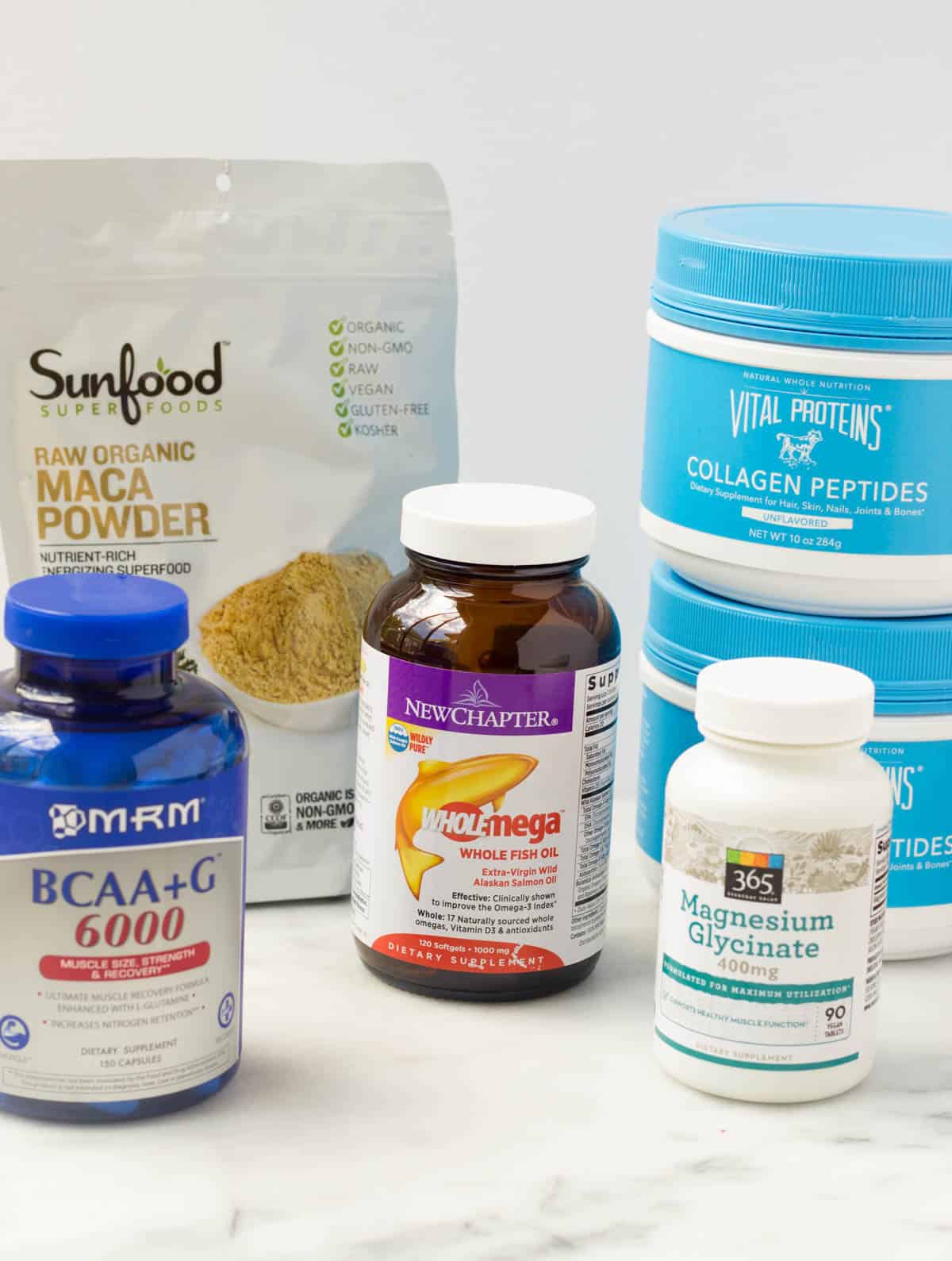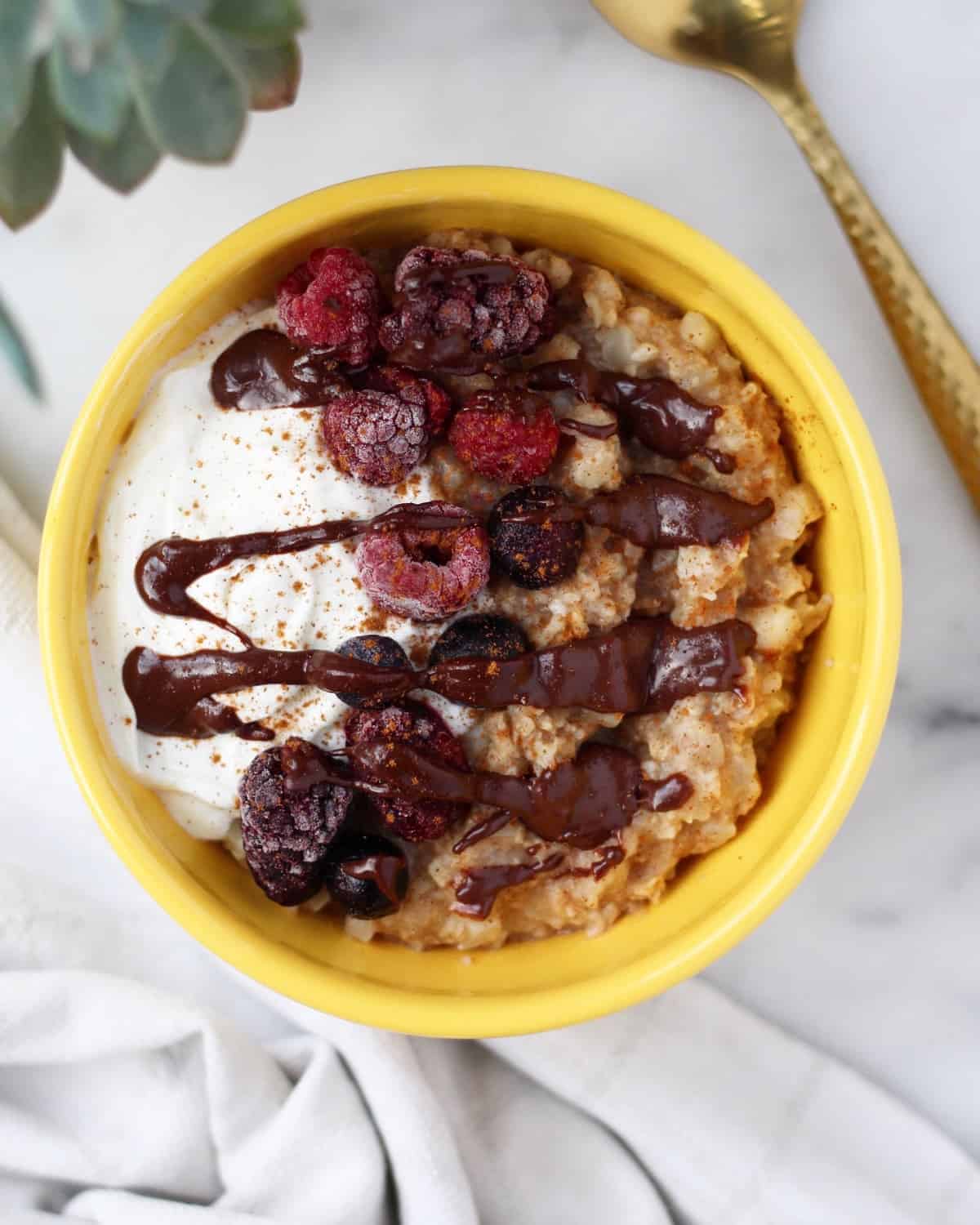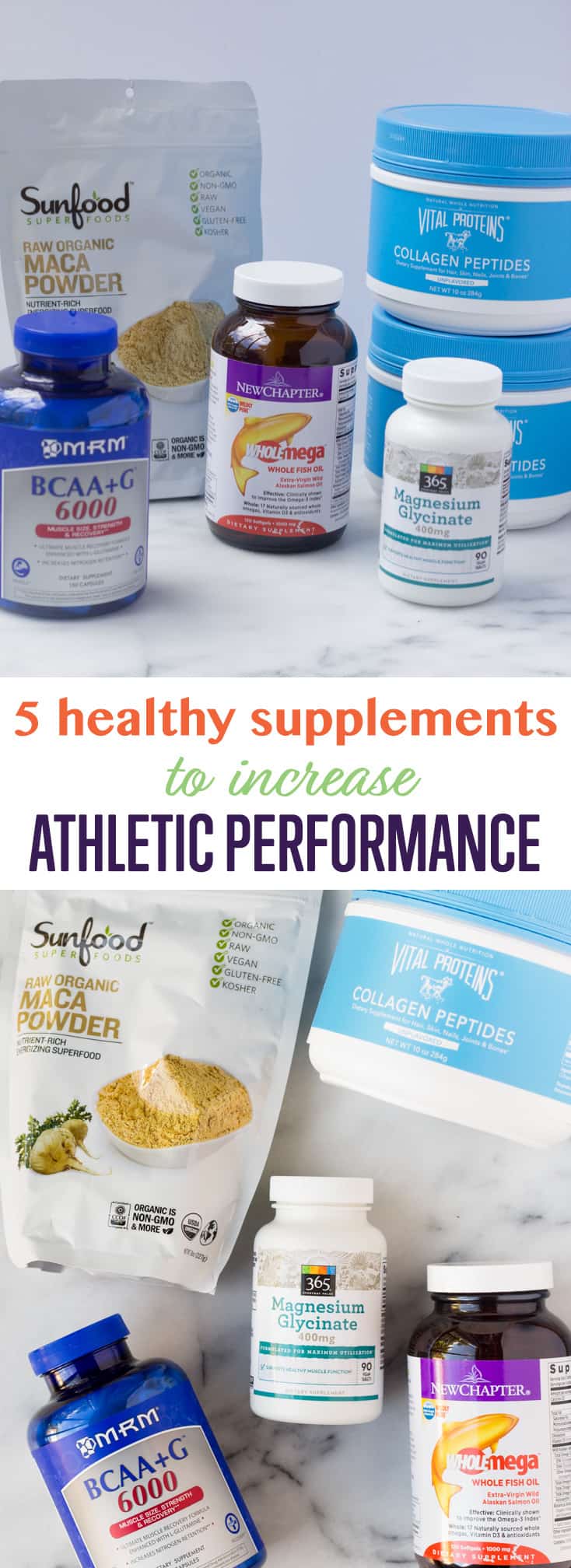Step up your fitness! Add these 5 healthy supplements to increase athletic performance – build muscle, recover faster, increase intensity, & reduce fatigue!

With so many vitamins, minerals, protein powders, juices, supplements, superfoods, and 100s of other things I am missing that are on the market, it’s easy to get overwhelmed. I know I have been there, and admit sometimes still fall into the latest buzz of what you should be taking. But I am all about keeping it simple while still being effective. That’s why today I’m diving into the 5 healthy supplements to increase athletic performance. I know 5 might sounds like a lot, but I bet most of these things you already consume or have been on your radar for some time.
It wasn’t until the past 6 months that I have really dived into pre and post workout nutrition and what I could be doing to help me become the best athlete I could be. In the beginning, I started my focus on my food timing around working out, and recently started to add in a few supplements to help my performance and recovery process.
Since starting CrossFit 5 and a half years ago I have come a long way, but still have a ways to go. As I get older, I can tell my body doesn’t bounce back the way it used to. Long gone are the days of 6-7 CrossFit workouts a week or CrossFit in the morning and running in the evening. More is not more for me anymore.
Fewer training sessions while putting is 110% effort during those sessions is how I train now. And with the addition of these supplements, I feel as though my body is getting an extra push in helping me recover and perform my best.
I recently had the chance to stock up on all of my favorites at Whole Foods Market. I love how transparent they are and committed to sourcing the highest quality vitamins and minerals – they have a list of 50 ingredients that are not allowed in personal care products offered and no products are tested on animals. Lower-quality supplements add things like starch, extra gelatin, artificial colors, sweeteners and preservatives, lactose, unnecessary fillers and hydrogenated fats, which you won’t find at Whole Foods Market. To celebrate Whole Foods Market supplement sale (it’s August 11, 12, and 13th, 2017 and 25% off ALL supplements!!), I’m sharing my top 5 healthy supplements to increase athletic performance!
Collagen
Collagen has gotten so much hype in the past year and it 100% deserves it. I discovered beef gelatin a few years ago in an attempt to make healthier gummies and remember thinking how much protein it had in it for just a tablespoon. If only I would have started taking it regularly back then.
Collagen is an important building block in our bodies – it’s the most abundant protein in our bodies and is found in muscles, bone, skin, the digestive system, tendons, and blood vessels. It is pretty much the “glue” that helps hold the body together. As we age, the production of collagen decreases.
Benefits:
- Protein – it’s well known that protein helps build muscle and the more lean muscle mass you have on your body, the more efficient your body is at burning fat. Also, protein post exercise helps enable the replacement of lost proteins that occurred while you were working out.
- Going off of above, glycine (an amino acid found in collagen) may help increase your metabolism by adding lean muscle mass and helping with the conversion of essential nutrients
- Collagen contains arginine, which boosts the bodies ability to make protein from other amino acids, which is important in repairing muscle tissue and aiding in growth in development after a workout
- Helps reduce pain and prevent injury by strengthening joints and ligaments and helping them move easier
- If injured, it can help speed up recovery time – collagen formation is key when healing torn or ruptured muscles by aiding in the regeneration of muscle fibers and the production of connective scar tissue
Uses:
Depending on the brand, most collagen is tasteless and dissolves easily, making it super easy to add it to just about anything. Look to add it post workout as your body needs protein to help repair muscle mass that was broken down. Here are just a few ways to add it to foods:
- Add a scoop to your morning coffee or tea
- Blend in a smoothie – doubles as your protein
- Mix into your oatmeal, overnight oats, or yogurt
- Add into baked goods
- Stir into sauces, dips, or spreads
- Baked sweet potato fries – mix with oil and spices as a coating before baking
- Mix into cooked whole grains
Besides all of those factors, it can also improve the health of your skin and hair, improves gut health, strengthen your hair, nails, and teeth, improves liver health, reduce wrinkles, cellulite, and stretch marks, and give you glowing skin. With all of those benefits, it’s hard to pass it up. I like to add it wherever I can throughout the day since it is so powerful.

Collagen added to an iced matcha green tea
Fish Oil
Fish oil is another supplement that has been in the spotlight for years, and not just for athletes. A lot of the time it is recommended for heart health. Our diets today provides a ratio of omega 6 to omega 3 fatty acids in the range of 10:1 to 20:1 instead of 1:1 or 2:1. Too much omega 6 is linked to inflammation and since our bodies can’t produce omega 3s, we need to get them somewhere else. Fish oil contains those omega 3 fatty acids (EPA and DHA) to help counteract that.
Benefits:
- Can speed up your recovery time – omega 3s are powerful anti-inflammatory compounds that help repair the tears in your muscles after exercise
- Taking omega 3s combined with physical activity helps increase protein synthesis, helping your body take the protein you eat and feeding it to your muscles
- Going off the bullet above, increased muscle protein synthesis translates to an increase in muscle strength, performance, and capacity
- Can reduce DOMS (delayed onset muscle soreness) due to omega 3s anti-inflammatory properties and helping aid in the recovery process
- Decrease your heart rate and the amount of oxygen your body burns while working out – pretty much it takes less energy to do physical activity
- Improves cognitive functions – omega 3s can enhance decision making and reaction time efficiency by increasing communication between the brain and the body
- Immune system booster – can help improve the body’s reaction to exercise induced stress
- Can help strengthen bones – fatty acids may increase your body’s level of calcium absorption and help with bone growth
- Weight loss – the combination of physical activity and the addition of fish oil can hep reduce body fat and improve metabolic health
It doesn’t stop there either – fish oil (omega 3s) is linked to helping ADHD, Alzheimer’s disease, anxiety, cancer, depression, diabetes, eye disorders, skin and hair, fertility, and more. Even if you consume wild caught fatty fish a few times a week, it is still beneficial to take fish oil. It can be taken anytime during the day and doesn’t have to be around your workouts – most people like to take it while eating a meal. Look for sources from cold water, fatty fish.
BCAAs
BCAAs, or Branched Chained Amino Acids, are new to me, but I have heard so many great things about them that I finally looked into them and started taking them. The thing that was deterring me the most was everyone was drinking them and more than likely they were watermelon or blue razz “flavor”, which means artificial ingredients like red 40 and blue 5.
When I stumbled upon a capsule form at Whole Foods – I know I can trust their quality standards – I was so excited! The only ingredients were the BCAAs (vitamin B6, leucine, valine, isoleucine, and glutamine) along with gelatin from the capsule. For me this was huge – I would be taking these daily and didn’t want more ingredients than needed.
Here are the some of the benefits of BCAAs:
- Help maintain muscle mass while on a calorie deficit. When we are dieting, or in a calorie deficit, the body turns to muscle for energy as it tries to hold onto body fat. BCAAs (especially leucine) help increase the rate of protein synthesis and the cell’s capacity for protein synthesis, helping us maintain and gain lean muscle mass.
- They can reduce the rate of protein breakdown – similar to above, BCAAs help maintain lean muscle mass. Both of these can help reduce muscle soreness after exercise.
- Can help improve workout intensity. BCAAs can help reduce the amount of tryptophan – yeah, the same stuff in turkey that makes you sleepy – that enters the brain, which can then reduce the amount of serotonin (increases the perception of fatigue) produced. Less fatigue means more time to work harder and longer.
- BCAAs in supplement form require no digestion, meaning they are rapidly absorbed into the bloodstream and can be used as a direct energy source during your workouts. When they are digested in their natural state (in food), it takes longer to digest and won’t be used as quickly.
While, you can get BCAAs from food, if you are training hard and performing multiple intense workouts a week, a BCAA supplement is something to consider. I take mine pre and post workout for optimal benefits.

Maca added to morning oatmeal
Magnesium
Magnesium is a vital mineral for the body – it has role in cardiac activity, nerve function, blood pressure regulation, hormonal interactions, bone health, and many more. But up to 80% of the population is estimated in being deficient in this crucial mineral. Low magnesium levels have been linked to inflammation, osteoporosis, anxiety, trouble sleeping, poor digestion, and more.
Some of the benefits of magnesium include:
- Helps increase energy – magnesium has an important role in anaerobic and aerobic energy production, especially the synthesis of ATP (adenosine triphosphate), which helps regulate energy and keeps you moving. Without ATP you don’t have the energy you need and can suffer from fatigue.
- Can assist in performance by reducing the build up of lactic acid and reducing the perception of fatigue.
- Replenishes energy stores in muscles, which can help aid the recovery process – without it, the enzymes that enable muscle protein synthesis are impaired, which can compromise strength, recovery, and hypertrophy.
- Helps relieve muscle cramps and and aches – it helps muscles relax and contract
- Aids in sleep – everyone knows quality sleep is an huge asset in recovering, especially if you are doing strenuous activities. Magnesium can help relax your muscles, quite your mind, and help your heart rate to get those 8 hours you need.
It’s easy to fall short of the recommended dose of magnesium, especially if your diet is low on whole grains, leafy green vegetables, nuts, seeds, an pluses (beans and legumes). Since magnesium plays such a huge role in our body, I think it’s a win win to add in additional supplementation, just be careful as too much can become a laxative. I like to take mine after I workout along with my BCAAs – taking both at once helps me remember.
Maca
It’s not all about supplements. You guys know that food is my #1 when fueling my body. The power of food is so amazing and should really be on the forefront when trying to heal/aid/fuel/help your body. So last, but certainly not least is maca.
Maca is considered a “superfood” – it’s an adaptogen and a member of the cruciferous family. It has been used as a food and medicine in South America for centuries. The root veggie is usually available in ground form/powder, which is how I use it.
Benefits:
- Can help increase energy levels and can be used to help fight fatigue
- Increase in endurance and stamina – some people like to take it before working out for these reasons
- Helps regulate hormones with can help preserve muscle mass – maca can help boost testosterone (helps boost production of muscle mass and boost metabolism) and reduce excess estrogen (related to fatigue, weight, and recovery)
- Amino acids – maca contains 18 of the 20 amino acids needed in the body. These help improve performance and muscle recovery and regrowth.
- Contains iron which supports the restoration of red blood cells and supports blood health
- Contains manganese which supports bone health
- Helps improve focus
- Immune system booster
It is also high in plant soluble protein. fiber, magnesium (see above for benefits), and calcium.
Uses:
Maca is a little sweet and nutty, and has a caramel-like flavor, which is probably why I love it. Here are just a few ways to add it to your diet:
- Smoothies
- Oatmeal and overnight oats
- Yogurt
- Nut butter
- Baked goods or energy bars/bites
While the price seems to be a little steep, add just 1-3 teaspoons a day comes out to be fairly cheap, and it is great addition to your pre workout meal/snack. I add it throughout the day depending on what I am having/making.
What are some of your favorite supplements to adding to your fitness routine? Make sure you head over to Whole Foods Market next week and take advantage of their supplement sale – 25% off vitamins, minerals, probiotics, protein powders, superfoods, antioxidant, and more! – and stock up on all your favorites!

Please note that I am not a doctor and these are just recommendations as to what I have found works best for me.
This post is sponsored in partnership with Whole Foods Market. All opinions expressed (as always) are my own. I only partner with brands I trust and personally recommend – thank you for your support in helping make Eat the Gains possible!




![My First Marathon [San Antonio 3:33] + Your Body is Capable of so Much More](https://eatthegains.com/wp-content/uploads/2016/12/IMG_9758-150x150.jpg)



Pamela Hernandez says
My life changed when I figured out I could add my BCAA powder to my matcha latte. 🙂
Kelly says
OMG that is genius!! I will have to try that, sounds like a great way to get them in!
Kat Downs says
Thanks for the great tips, Kelly! I used your recommendations when shopping the sale this past weekend!!
Kelly says
YAY!! I hope you stocked up, it is such an amazing sale!